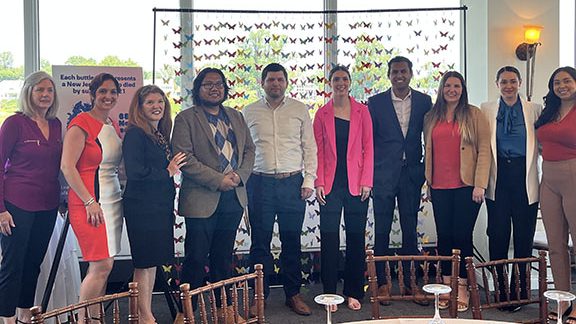
By Sunayana Prabhu
RED BANK – Warmer months are ahead of us and although cold dark weather can bring on the blues, summer comes with its own set of challenges for those struggling with mental health.
The New Jersey chapter of the American Foundation for Suicide Prevention (AFSP) and the Society for the Prevention of Teen Suicide (SPTS) joined forces to emphasize the importance of mental health awareness and suicide prevention, particularly the well-being of students during the summer months.
“Summer can actually be more difficult for some kids,” said Susan Malone, clinical director of SPTS, at a press event held May 31 at the Oyster Point Hotel, noting that summer does not always take depression away. During the school year, students have access to resources and a structure that can help fight symptoms, but the absence of that daily support system throughout the summer break could make youth more vulnerable.
“The isolation (of summer) can be devastating,” said Stacey Donovan, director of strategic partnerships for SPTS.
An increase in suicide rates during COVID due to “dependency and connection to social media” has been “steady,” Donovan said during the conference.
The SPTS recently received a $250,000 state grant to support its efforts in providing informational tool kits to schools in Monmouth and Ocean counties. Those include a behavioral health kit and a mental health crisis tool kit with resources and guidance for parents and caregivers who need to remember that mental health is not a result of “bad parenting,” Donovan asserted. The tool kits offer safety plans, lists of care management organizations in the county and more. They are readily available at no cost in schools and hospital emergency rooms.
Elizabeth Clemens, executive director of the New Jersey chapter of AFSP, provided statistical data from the state. In New Jersey, suicide is the third leading cause of death for youth and young adults ages 10 to 24. This age group makes up 13% of all suicide deaths in the state. Suicide is the fourth leading cause of death for those ages 25 to 34 and the sixth leading cause of death for ages 35 to 54. According to the 2021 Youth Risk Behavior Survey, in 2020 more than one in three New Jersey high school students reported feeling sad or hopeless almost every day for two or more weeks in a row.
Summer is not as relaxing and fun as it is expected to be for some, shared Marykate Sharkey, a student. She said a lot of teenagers have to “start thinking of the big picture,” find a summer job and handle the pressure of trying to “become an adult,” all while “fitting in with your friends,” Sharkey said. “(It) can be very hard.”
Sharkey also said peer pressure about “smoking, vaping and drinking” can be “very scary and overwhelming.”
“It’s a very slippery slope,” she said. “You’ve got to put yourself in situations you feel safe and comfortable in and try and really protect yourself.”
And connecting with others is a major part of protecting against depression.
“Connection is protection,” Malone said. She urged kids to let “trusted adults” – not necessarily parents – know if they are struggling.
Sharkey emphasized that avoidance is not a good tactic. “Just don’t isolate yourself. Don’t be alone. Find one person and really talk, have an open dialogue. Don’t hide things and think it’ll get better,” she said.
She noted a lot of times people will not talk to someone about their feelings because they don’t want to be a burden, but “you’re not necessarily adding to their plate, you’re taking off from your plate.”
From her personal experience supporting her older sister with mental health struggles, “it’s so important to not handle everything yourself. Everyone needs help.”
Malone suggested several youth services available at no cost and accessible anytime, particularly during the holidays and spring or summer breaks when school is closed. 2NDFLOOR is a statewide, confidential prevention helpline available 24 hours a day; Crisis Text Line offers 24/7 support – text HOME to 741741 to chat with a counselor; and the 988 Suicide & Crisis Lifeline (formerly known as the National Suicide Prevention Lifeline) offers 24/7 call, text and chat access to anyone in emotional distress.
Advocacy and public policy efforts of AFSP and SPTS have made students’ mental health in schools a priority and drives the conversation to destigmatize these issues. The AFSP advocates for protective actions like increasing acceptance and affirmation of LGBTQ+ identities to reduce prejudices and the likelihood of LGBTQ youth suicides.
During the press conference, both organizations acknowledged state Sen. Vin Gopal (D-11) for his dedication to mental health and wellness across the state.
Gopal, who has been vocal about his struggles with mental health, said, “I think a lot if it was addressed when I was younger, in my teen years, I probably would have been better, but I didn’t start medications and therapy until way later in my life, which made things harder, compounded things. I still struggle regularly.”
Gopal added, hoping to remove the stigma around mental health crisis, “We had a staff meeting last night. I ran out at 9 o’clock because I was having a tough night. And I share those stories at schools often because I want to make sure that it’s normalized as much as possible… maybe it’s an illness in the family, maybe it’s economics, maybe it’s something that happened in school, but that’s part of life and you have to address it. Ignoring it has a really negative impact which will compound year after year after year.”
By raising awareness and providing necessary tools, these organizations hope to save lives and foster a culture that prioritizes mental health.
The 988 Suicide and Crisis Lifeline is a hotline for individuals in crisis or for those looking to help someone else. To speak with a trained listener, call 988. Visit 988lifeline.org for crisis chat services or for more information.
The article originally appeared in the June 1 – 7, 2023 print edition of The Two River Times.














